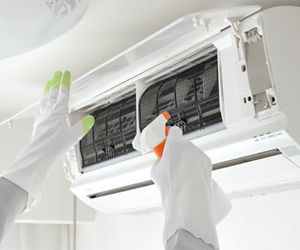AC Repairing Guide
Knowing how to fix common AC problems is important for keeping your home warm. Certain problems typically cause your air conditioner to malfunction when it’s not working correctly. These issues include jammed filters, dirty coils, or a malfunctioning compressor, all of which can result in insufficient cooling. If your AC unit is making noises like hitting, grinding, or squealing, it may be a sign of deeper problems. Leaks of refrigerant are another common problem that can make your AC much less effective at cooling. Your cooling system may not work as well if air doesn’t move properly. This can be caused by a dirty filter, clogged ducts, or problems with the blower motor. Finally, if your thermostat isn’t working right, the temperature in your home might not stay the same.
Troubleshooting Tips for AC Repairing
Troubleshooting your air conditioner is a useful way to fix common problems and make sure it works well. First, make sure the thermostat is set to the right temperature and in the “Cool” mode. If you have a digital thermostat, you may need to change the batteries. Changing or cleaning the air filter on a regular basis, typically every one to three months, can improve air quality and enhance system performance. Remember to turn off the AC before doing this. Maintenance is very important for outdoor condenser units. Turn them off and remove any trash and plants. Then, use a brush or hoover to gently clean the condenser fins and a fin comb to fix any bent fins. Also, make sure the condensate drain stays clear. If it gets plugged, use a wet/dry vacuum to get rid of the debris and a vinegar-and-water mixture to flush the drain.
When to Call in the Professionals for AC Repairing
When to call a professional for AC repair is an important choice that will affect how well and how long your cooling system works. Your AC unit makes strange noises like hitting, grinding, or squealing, you should get professional help right away. These sounds clearly indicate a significant problem requiring diagnosis and resolution by a professional. Another issue is refrigerant leaks, which professionals should exclusively address, as they can pose a hazard without the proper tools and expertise.If you think your AC has electrical problems, like wiring or circuitry problems, you should also call a licenced electrician or HVAC worker. Electrical problems can be dangerous and need specialised knowledge to fix safely. Frequent short cycling, in which your AC unit turns on and off quickly, can be a sign of a number of problems, such as a broken thermostat.
Essential AC Repairing for Efficient Cooling
To ensure that your air conditioner works well and cools your home, you need to perform basic repair tasks. The most crucial task is cleaning or changing the air filter every one to three months, depending on usage frequency and the type of filter in use.. A clean filter is important for both keeping the air inside your home clean and making sure your AC works well. It’s also important to clear the area around the outdoor condenser unit to make sure air flows well, which is necessary for cooling to work well. Another important job is to check your AC system for refrigerant leaks since low levels of refrigerant can make cooling much less effective. If you think you have a leak, you should get a professional to find it and fix it. You should regularly clean the evaporator and condenser coils with a soft brush or vacuum cleaner to ensure they work at their best. Clean coils help heat move more efficiently, which is an important part of cooling. Lastly, you should test and calibrate the thermostat on a regular basis to make sure that it correctly displays the temperature settings you want.
Preventive Measures to Extend Your AC’s Lifespan
Take these precautions to make sure your AC unit lasts as long as possible and works at its best. First, buy a programmable thermostat. This type of thermostat lets you set plans for the temperature. By raising the temperature while you’re away or asleep, you can save energy and keep your system in better shape. Second, make sure your home is properly insulated to keep cool air in and hot air out. This will make your AC work less hard and make your home more comfortable and energy-efficient. Next, let trees or an awning provide shade for your outdoor condenser unit. This will keep it from getting full sunlight, which will lower the amount of energy it needs to cool. Putting in ceiling fans can also help move cool air around more efficiently, which means you can raise the thermostat a few degrees without losing warmth. Lastly, make sure your air ducts are in good shape by cleaning and closing them on a regular basis.

